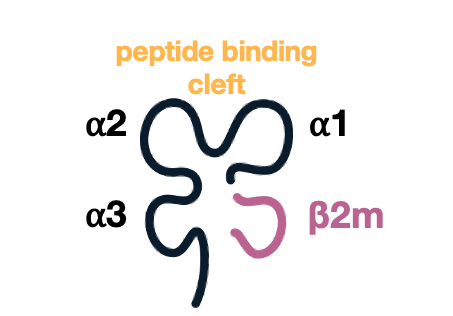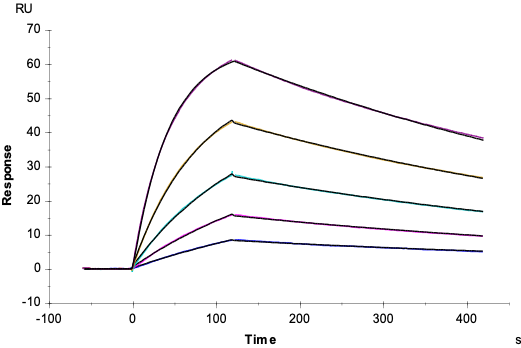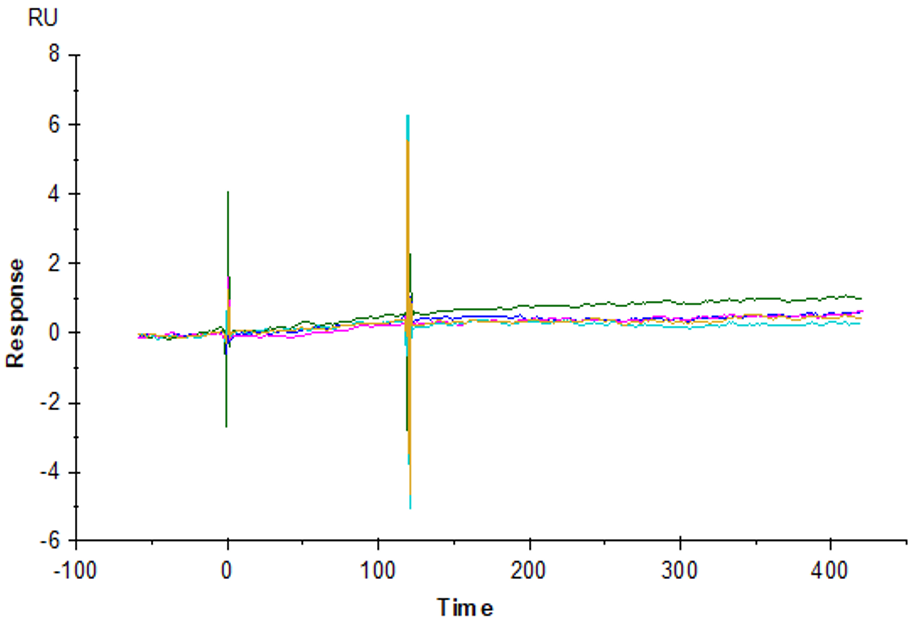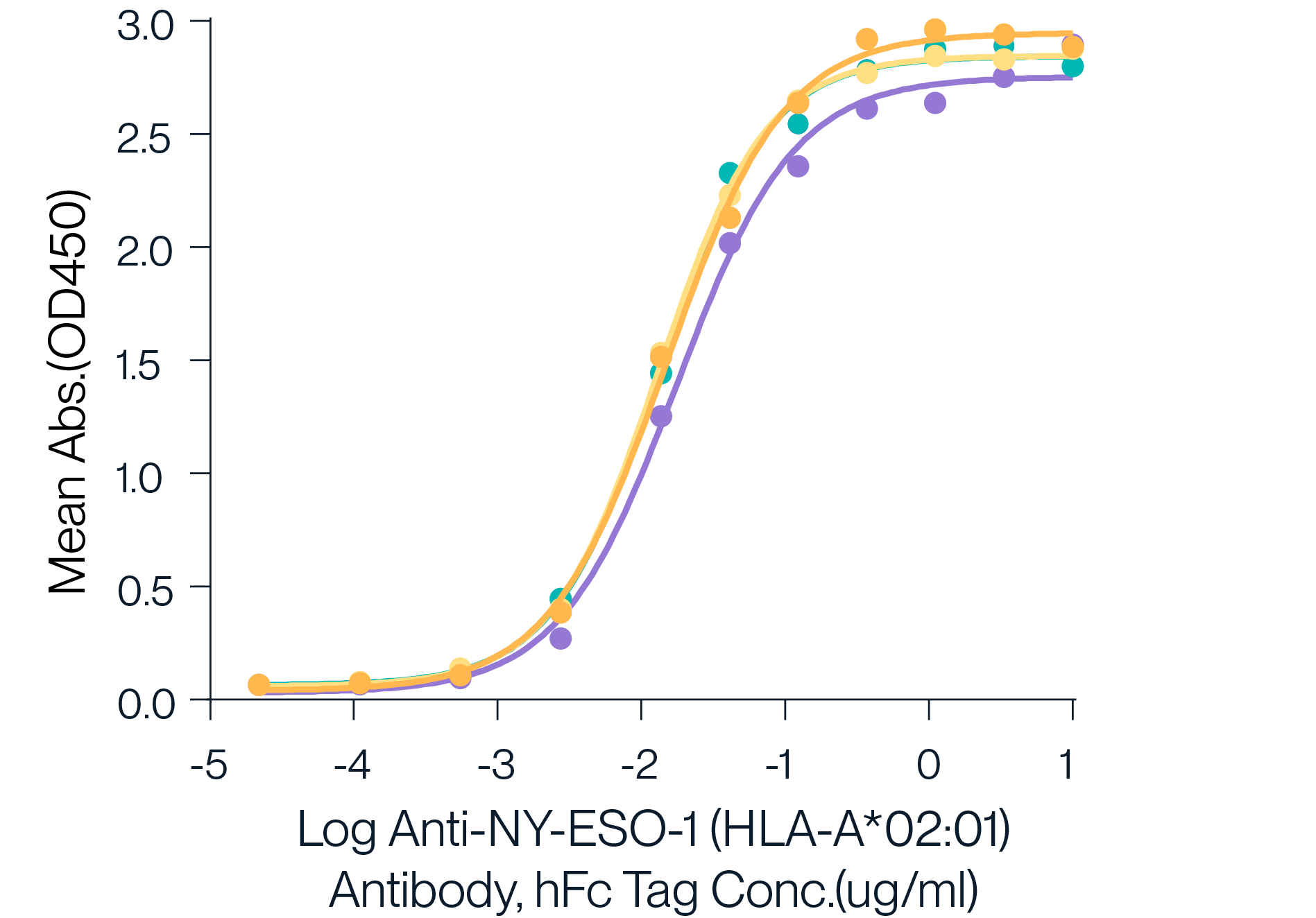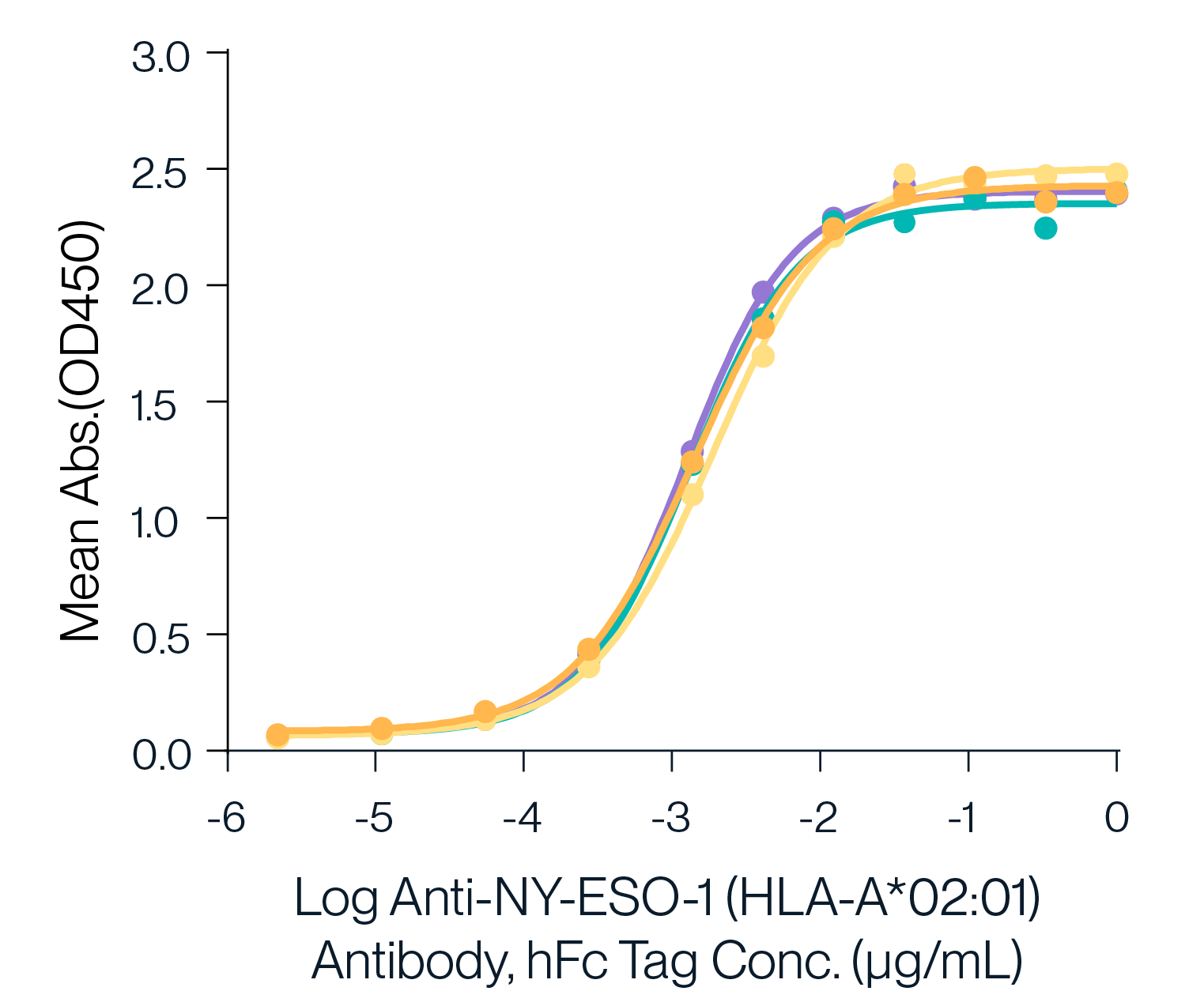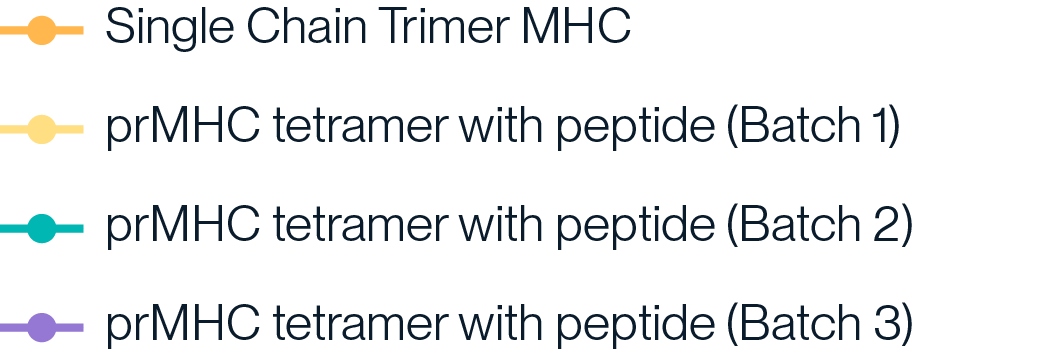Load MHC monomers or tetramers with custom peptides in-house
Peptide-ready MHCs are stabilized, peptide-free MHC molecules
We have developed a portfolio of peptide-ready MHC (prMHC) proteins which are MHC monomers or tetramers stabilized without an antigenic peptide. These MHCs are 'peptide-ready' meaning they can be loaded with your custom neoantigen peptide in-house to generate a custom MHC monomer or tetramer.
Simple, Fast, & Effective Peptide Loading Protocol
Our prMHCs can be loaded in your laboratory with a quick 3-step loading protocol. The peptide is dissolved in DMSO or PBS, mixed with the prMHC at a molar ratio of 5:1 or 10:1, and then incubated for 5-10 minutes at room temperature.
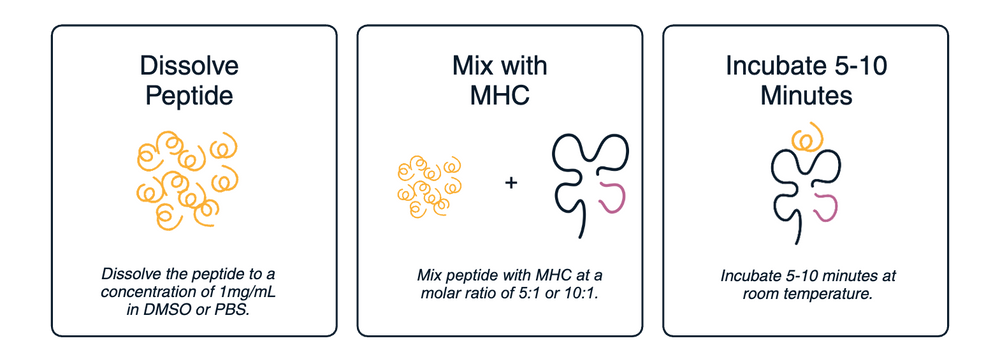
Advantages:
- Quick loading time
- Easy-to-operate protocol
- High-throughput compatibility
- Does not use UV or peptide exchange technology
For a more detailed protocol or for scientific support for your application, please contact us.
Product Applications
High-Throughput Neoantigen Screening
For researchers to evaluate tumor-specific antigen candidates, they must assess the immunogenicity of the antigenic peptide. Not all MHC-presented peptides will elicit an immune response from the T cell receptor (TCR). The recognition of the MHC-peptide (pMHC) complex by the TCR must be tested. In silico models can be used to predict the immunogenicity of antigenic peptides, but actual TCR reactivity must be experimentally validated. To facilitate this work, KACTUS has introduced a catalog of peptide-ready MHCs. These peptide-receptor MHC molecules can serve as a ready-to-use loading system for creating MHC-peptide complexes with custom neoantigens. By mixing the peptide-ready MHC with a custom peptide, a custom MHC-peptide complex is generated. This aids neoantigen screening studies by providing a quick and easy way to generate custom MHC-peptide complexes in-house for in vitro screening assessment. The fast and simple peptide-loading protocol makes screening large numbers of peptide candidates more efficient than other peptide exchange MHC technologies.
Assess TCR-pMHC Affinity
The TCR-pMHC affinity can be assessed as a way to characterize TCR-pMHC specificity or T cell responses. This may be used in the development of Chimeric Antigen Receptor-T cell therapy (CAR-T therapy) or TCR therapy. By enabling rapid and quality generation of custom Class I MHC tetramers, our peptide-ready MHCs can be used to analyze TCR-pMHC affinities via ELISA or Surface Plasmon Resonance (SPR). These peptide-ready MHCs can be loaded with a custom peptide quickly at room temperature to generate an MHC-peptide tetramer complex. These molecules can be used to determine the binding affinity of TCR-pMHCs.
Detect Antigen-Specific T Cells
Our peptide-ready MHC tetramers can be used to detect antigen-specific T cells for research and immunotherapy development. By loading the peptide-ready MCHs with a specific peptide, researchers can generate a custom MHC-peptide tetramer. By using our fluorescently-labeled peptide-ready MHCs, the fluorescent MHC tetramer can be used in flow cytometry to selectively bind to T cell subpopulations. This allows for identification and quantification of antigen-specific T cells for novel or proprietary neoantigens. Sorting antigen-specific T cells is useful for assessing antigenic immune responses, developing targeted vaccines or immunotherapies, or acting as positive controls for cell therapy development.
Specific Application Scenarios:
Custom prMHC
KACTUS also offers custom expression of other MHC alleles including class II alleles and non-human species. To request a quote, submit our custom MHC form.
Product Validation Data
TCR Binding
Loaded Peptide-ready MHC
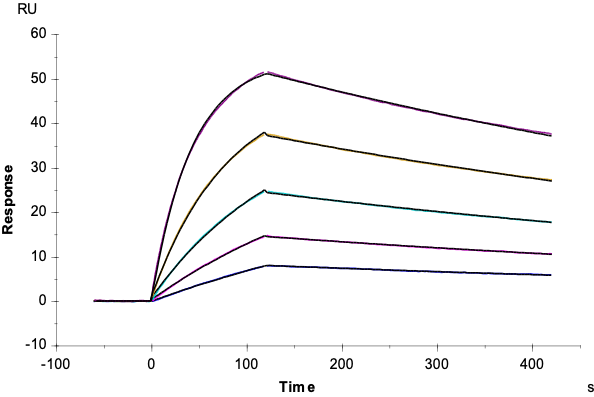
Human prMHC monomer (HLA-A*11:01), His-Avi Tag, with KRAS G12D peptide
ka (1/Ms): 1.07E+5
ks (1/s): 1.60E-3
KD (M): 1.49E-8
Figure 1. Surface Plasmon Resonance (SPR) analysis of the interaction between KRAS-G12D specific TCR (JDIa41b1) and human MHC complexes. The analysis was performed using different monomers tagged with His-Avi. The loaded prMHC demonstrates equivalent binding performance as the single chain trimer MHC.
T Cell Sorting
Identifying antigen-specific T cells is crucial in immunotherapy development, infectious disease research, and autoimmune disease research. Our loaded peptide-ready MHC tetramers demonstrate good T cell sorting activity. After loading with a custom peptide, the generated MHC-peptide tetramers show high specificity and sensitivity in identifying antigen-specific T cells.
Figure 2. Flow cytometry analysis of Jurkat Cells with Human APC-equivalent prMHC Tetramer (HLA-A*02:01), His Tag. Results demonstrate specific binding of the MHC-peptide complex to the NY-ESO-1 specific TCR, with a significant increase in APC-positive cells in the presence of the MHC loaded with NY-ESO-1 peptide.
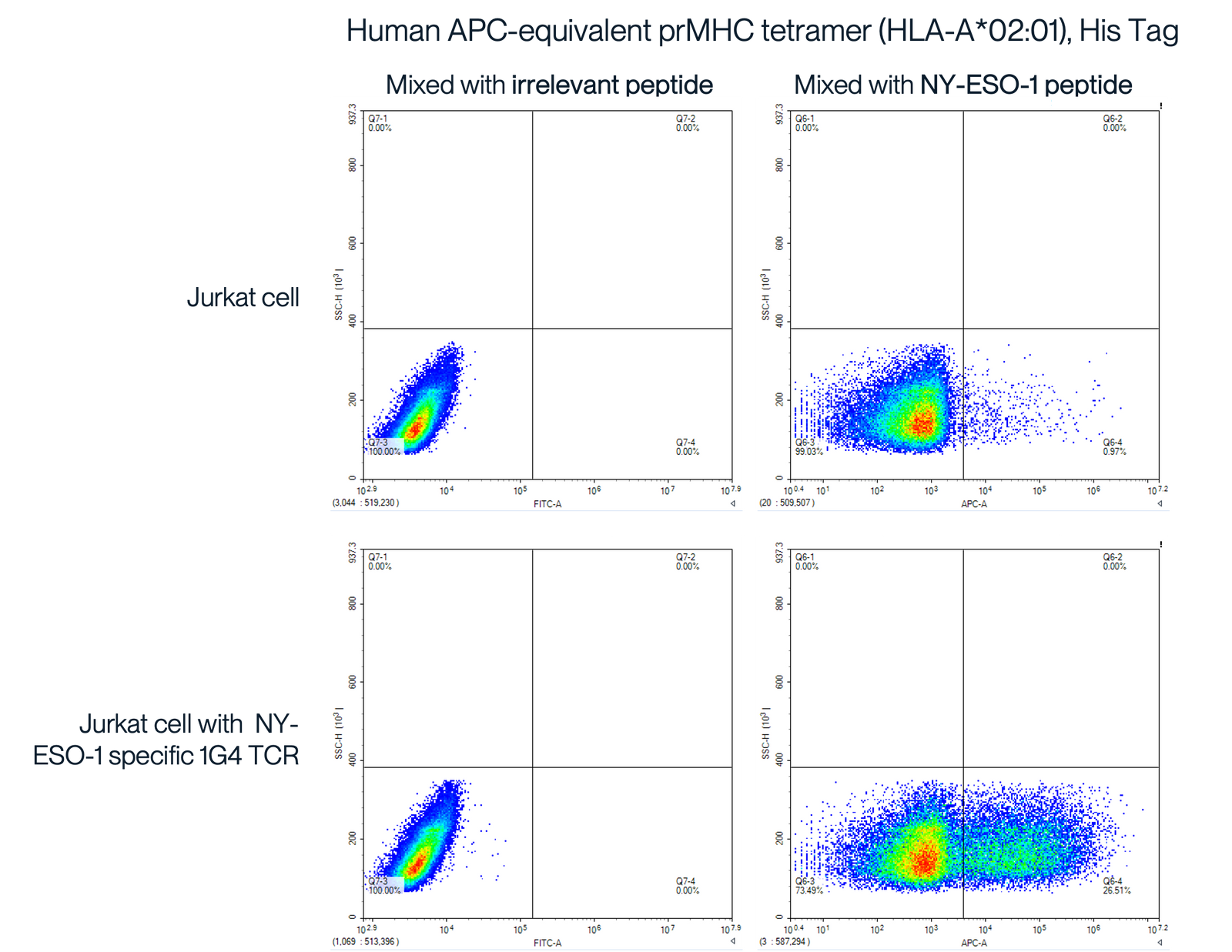
Batch Consistency
Our prMHCs demonstrate consistent activity across batches. This consistency is crucial for effective TCR assessment and is validated through our rigorous quality control testing. If you'd like to learn more about the quality, consistency, or stability of our prMHCs, please contact us.
Figure 3. ELISA data showing the batch consistency of Human HLA-A02:01&B2M&NY-ESO-1 (SLLMWITQC), His Tag monomer and tetramer. For both the monomer and tetramer, the single chain trimer MHC-peptide complex was compared to three separate batches of peptide-ready MHC loaded with NY-ESO-1 peptide (SLLMWITQC). Results demonstrate high reproducibility across batches.
Available Products
LEARN MORE
Neoantigen peptides and their role in MHC/TCR interactions
Neoantigens are highly specific targets and ideal targets for immunotherapy. Degraded neoantigen peptides can bind with major histocompatibility complex (MHC) molecules, forming complexes that are subsequently transported to the cell surface. These complexes are recognized by T-cell receptor (TCR), triggering an immune response. MHC polypeptide complexes constitute a category of neoantigen targets, and their distinctive interaction with TCR holds immense importance in the advancement of neoantigen-based immunotherapies, including TCR-T cell therapy, antibody drugs, and tumor vaccines.

Identification of the affinity of peptide loaded MHC with TCR [1].
Peptide-Ready MHCs FAQs
Peptide-ready MHCs (prMHCs) are recombinant MHC class I molecules that are stabilized without a bound antigenic peptide, allowing researchers to load custom peptides easily in their own labs. These products support applications such as TCR screening, antigen-specific T cell detection via flow cytometry, neoantigen evaluation, and affinity characterization using SPR or ELISA.
To load a peptide, dissolve your antigenic peptide in DMSO or PBS, mix it with the prMHC at a 5:1 to 10:1 molar ratio, and incubate for 5–10 minutes at room temperature. No UV,peptide exchange, or wash steps are required. For detailed buffer recommendations or assay-specific loading conditions, our technical team can provide a validated protocol upon request.
prMHC monomers consist of a stabilized peptide-free α-chain and β2-microglobulin. Tetramers are formed by multimerizing four monomers, typically for use in flow cytometry. Monomers are generally used in SPR, ELISA, or plate-based affinity assays, while tetramers allow for antigen-specific T cell staining and sorting.
Our fluorescent prMHC tetramers are available with APC-, PE-, or FITC-equivalent fluorophores, built into our proprietary single-chain design during mammalian expression. Biotinylated monomers and His-tagged constructs are also available to support different downstream assays, including SPR or BLI.
Yes. All prMHCs are engineered using our SAMS™ Protein Engineering Platform and expressed in HEK293 cells. The α-chain and β2-microglobulin are fused into a single-chain format, ensuring stability and easy tetramerization without requiring in vitro streptavidin assembly.
We offer a broad catalog of human alleles including HLA-A02:01, A03:01, A11:01, A24:02, and others. We also support custom expression of class I alleles and non-human MHC molecules for research involving different species or rare haplotypes.
Absolutely. prMHCs are ideal for high-throughput peptide screening, neoantigen immunogenicity assessment, and TCR-pMHC affinity studies. When loaded with specific peptides, these constructs can help identify or validate antigen-specific T cell responses and support TCR or CAR-T development.
Each batch is tested via SDS-PAGE, SEC-HPLC, and ELISA or SPR to confirm purity (>95%), identity, and function. Endotoxin levels are controlled below 1 EU/µg. Batch consistency is demonstrated across monomer and tetramer formats using antigen-specific binding assays.
prMHCs should be stored at -20°C – -80°C or at -80°C if reconstituted. Under proper conditions, products are stable for at least 12 months. Repeated freeze–thaw cycles should be avoided to maintain performance.
You can order catalog products directly online or by sending a purchase order to orders@kactusbio.us. For custom requests, submit the Custom MHC Form or contact sales@kactusbio.us. Standard lead time for custom orders is 6–8 weeks.





